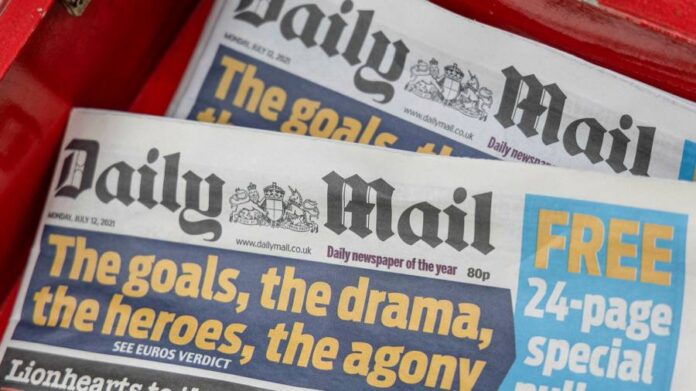Toppy tech valuations, exuberant capital markets, the hollowing-out of corporate Britain and the perils of dodgy corporate governance. It’s fitting that the proposed deal to take private the owner of the Daily Mail hits on quite so many aspects of the financial zeitgeist.
The paper has been running a vociferous campaign against the gobbling up of UK businesses by private equity firms, which flush with cash have been looking for a bargain in discount Britain.
Its own take-private transaction doesn’t come from the debt-fuelled, tax-shy world of US private equity.
Instead, the Rothermeres — via the family’s Bermuda-registered company RCL — are proposing to buy the 70 per cent of Daily Mail and General Trust that they don’t already own, after a series of deals and distributions that would in effect finance the family’s purchase.
Given the many uncertainties of this three-part deal, it’s hard to judge how likely DMGT is to join the hundreds of UK companies that have turned their back on public ownership.
First, enthusiasm for all things data means DMGT has received offers at a “premium valuation” to buy its insurance risk division, RMS. It is not saying for how much, or from whom.
But selling the modeller of catastrophe risk fits with recent disposals of techy businesses like education software arm Hobsons and energy information provider Genscape at strong valuations. Combined with DMGT’s existing cash, the sale of RMS could enable a special dividend of 610p a share, or about £1.4bn, depending on tax liabilities, the company said. Given its latest cash balances, it looks a fair bet that the mystery bidders are valuing RMS well above where most analysts have been.
The second pot of value again owes more to the company’s efforts as an investor in businesses than its history as an owner of newspapers. DMGT has a 20 per cent stake in Cazoo, the online car retailer that seized on US market mania to go public through a special purpose acquisition company, or Spac, with a mooted valuation of $8bn.
Quite how Cazoo actually trades remains to be seen — and there are again tax considerations to muddy the water — but distributing those shares to DMGT investors could be worth between 280p and 420p per share, or up to £970m, estimates Citigroup.
Finally, there is the old media rump. And all cashed up for their sales, the Rothermeres are proposing paying 251p a share, or a valuation of £810m including debt, to take private consumer media assets that include the Mail, Metro and i newspapers, as well as DMGT’s property information businesses and events operations. Agreements with pension trustees could scupper a deal.
What should other shareholders make of this three-pronged proposal? One way to look at it is that they may be offered a total of 861p a share for RMS and the DMGT rump. That is below last week’s £10.40 close but is about 10 per cent above where the stock was trading earlier this year before speculation around Cazoo’s Spac valuation began. Add on Citi’s range for Cazoo’s value, and you’ve got a total package offering a premium of between 10 per cent and 23 per cent over DMGT’s last closing price.
Another viewpoint is what the family are proposing paying for the core media assets of the business, which date back to the first issue of the Mail in 1896. The price is under one times the sales of the consumer media, property and events units, all of which have suffered in the pandemic. It’s a hefty discount to the “fair value” put on those businesses by Barclays, using 2022 ebitda by which time (you’d hope) the events business in particular would be getting back on its feet.
The irony of a keenly priced bid for Covid-wracked UK assets will be lost on no one given the Mail’s campaign against “pandemic plunderers”. Shareholders, however, may not care too deeply.
This seems a natural step after recent sales; DMGT clearly doesn’t see many good new opportunities to invest. The market isn’t likely to appreciate an increasingly subscale, low-growth conglomerate of old media assets, and there is no other buyer here.
Exactly who will have a vote on what isn’t yet clear. But the company’s dual-class share structure, which gives all votes to the family, means investors have been along for the ride as DMGT has quite successfully recycled capital, buying low and selling higher. This multi-part deal manages to combine both elements.
helen.thomas@ft.com
@helentbiz
Credit: Source link










